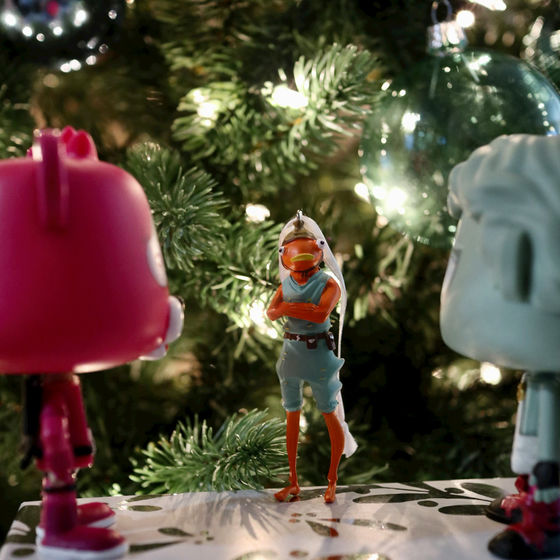The latest survey reveals that children who have not purchased paid skins are being bullied in a basic free-to-play game

Basic play is free, but an increasing number of games generate revenue by selling in-game items for a fee, such as skins that change the appearance of the characters you control during the game. The latest research has revealed that children who have not purchased paid items or skins are subject to bullying in these types of free-to-play games.
Fear being bullied: Children pay to become popular in video games

New Study Suggests Kids Are Now Experiencing Social Pressures to Buy In-Game Items
https://patrickklepek.substack.com/p/new-study-suggests-kids-are-now-experiencing
Kids Bullied For Not Buying Skins In Fortnite, Roblox, Warzone
https://kotaku.com/study-fortnite-free-to-play-games-kids-bullied-f2p-1851291618
Researchers Camilla Knudsen Steins and Clara Kria Reich from Oslo Metropolitan University in Norway were commissioned by the Norwegian Ministry of Children and Families to investigate the ``influence of money in gaming''.
Steines et al. comment on the importance of this study: 'There is still much to learn about the social dynamics within children's virtual worlds. Indeed, governments and policy makers around the world are interested in this topic from a regulatory perspective. 'Games are an important part of children's daily lives, but there is little research into young people's digital consumption in Norway.'
According to research by Steins et al., there is no clear distinction between the online and offline worlds for children. Therefore, the research report states, ``Games are just a different part of the social world that children navigate, and appearance, or skin, is an important identity marker.''

Frank, a 13-year-old who was the subject of the survey, talked about the importance of games, saying, ``If you don't play games with anyone, you won't have anything to talk about at school.''
'Peer pressure is similar to what already happens in other contexts, but it takes new forms in the gaming world,' the study says. 'Some children have access to resources to play with friends ( -Fi, consoles, in-game currency, etc.) can make you feel left out or bullied based on the skins you use.'
There are important differences when comparing games to other leisure activities for children. For example, in soccer, children are typically exposed to commercial content, such as advertisements for soccer shoes, within a specific physical context (e.g., the soccer court) and for a limited time (e.g., during a training session). However, Steins and his colleagues argue that games use a variety of customized marketing strategies that target children's needs to feel a sense of belonging and individuality. It also pointed out that games employ a variety of deceptive design strategies (such as
In fact, the free-to-play Fortnite was awarded $245 million (approximately 37 billion He was ordered to pay a fine of ¥2.
Fortnite is ordered to pay a fine of approximately 33 billion yen for ``using dark patterns to make children purchase unintended items'' - GIGAZINE

Stines and colleagues also found that some children were unaware that they were using real money to obtain in-game items such as skins. He also pointed out that this is evidence that Fortnite and Roblox, which are free-to-play games, intentionally make it difficult to understand that in-game items are purchased using money.
However, this does not mean that children are completely unprepared for paid items. It has also been revealed that some children use various strategies to protect themselves from paid items, such as ``not opening in-game item shops'' and ``doing housework instead of playing games.'' .
Steins said, ``In Norway, gambling in real casinos has age restrictions and is strictly regulated.However, despite having similar real money gambling elements, the games have very few rules. This situation is likely to change in the coming years, and game developers will need to comply with more regulations, especially regarding gambling elements in children's games. ” he said.

Additionally, parents' knowledge of games and paid items varies widely. While some parents introduce games to their children and play with them, others are skeptical about the social value games create or are reluctant to allow their children to purchase in-game items. Some parents seem to have restrictions. The survey also confirmed cases in which children who were bullied or hacked in-game asked their parents for help and guidance.
In the past, gaming media Polygon reported that ``children who play Fortnite with the initial skin are being bullied.''
Children who play with the initial skin in Fortnite, which is free to play, are being bullied - GIGAZINE

◆Forum now open
A forum related to this article has been set up on the GIGAZINE official Discord server . Anyone can write freely, so please feel free to comment! If you do not have a Discord account, please create one by referring to the article explaining how to create an account!
• Discord | 'Have you ever bought a ``paid skin'' that changes the appearance of your character in a free-to-play game? ' | GIGAZINE
https://discord.com/channels/1037961069903216680/1212332112162725940
Related Posts:
in Game, Posted by logu_ii






